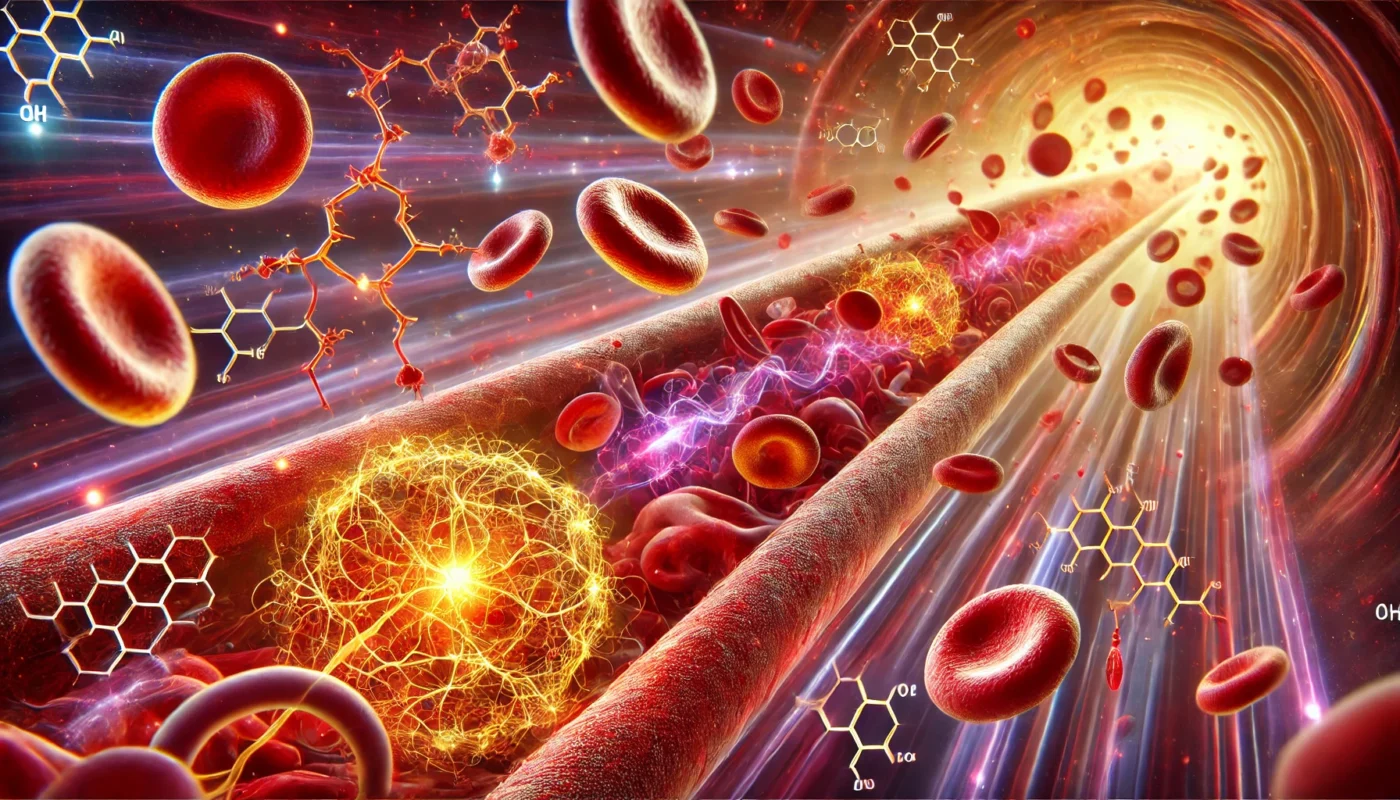Blood clots are a significant health concern, contributing to conditions like deep vein thrombosis (DVT), pulmonary embolism (PE), and strokes. These events, often life-threatening, can occur when platelets aggregate excessively or when blood flow slows and clots form. While various pharmaceutical interventions exist, there is growing interest in natural solutions to promote vascular health and reduce clot risk. Magnesium, particularly in the form of magnesium glycinate, has shown promise as a supplement that may reduce clotting risks and support overall cardiovascular health.
This article explores the emerging research on magnesium glycinate’s role in blood clot prevention, its mechanisms of action, and its potential for promoting vascular health.
You May Also Like:
Magnesium Glycinate as Part of a Postpartum Recovery Plan: Here’s the Science
Can Magnesium Glycinate Help Reduce Nighttime Leg Cramps? Here’s What to Know
The Basics of Blood Clot Formation
Blood clots form as part of the body’s natural healing process to prevent excessive bleeding. However, clots that form unnecessarily or fail to dissolve properly can obstruct blood flow and lead to serious complications.
Types of Blood Clots
- Arterial Clots: Form in arteries and are associated with heart attacks or strokes.
- Venous Clots: Develop in veins, often in the legs, leading to conditions like DVT or PE.
Risk factors for blood clots include immobility, obesity, smoking, hormonal changes, and underlying health conditions like diabetes or hypertension.

Magnesium’s Role in Cardiovascular and Vascular Health
Magnesium is a critical mineral involved in over 300 enzymatic reactions, many of which influence cardiovascular health. Its functions relevant to blood clot prevention include:
- Regulating Blood Vessel Tone: Magnesium relaxes blood vessels, improving circulation and reducing the risk of clot formation.
- Modulating Platelet Aggregation: Magnesium reduces platelet stickiness, which may lower the risk of clots.
- Supporting Fibrinolysis: Magnesium aids in the breakdown of clots, ensuring blood flow remains unimpeded.
Magnesium Deficiency and Clot Risk
A magnesium deficiency can impair these processes, increasing clotting risks. A 2016 study published in Circulation found that low magnesium levels were associated with a 50% higher risk of cardiovascular disease events, including those involving clot formation.
What Is Magnesium Glycinate?
Magnesium glycinate is a chelated form of magnesium, where the mineral is bound to glycine, an amino acid. This formulation is highly bioavailable, meaning it is easily absorbed and utilized by the body. It is particularly advantageous for individuals looking to support cardiovascular health due to its gentle effects on the digestive system and its calming properties.

How Magnesium Glycinate Helps Prevent Blood Clots
1. Reducing Platelet Aggregation
Excessive platelet aggregation is a key step in the formation of blood clots. Magnesium helps regulate this process by reducing platelet activation and preventing them from clumping together unnecessarily.
- Clinical Evidence: A 2020 study in Thrombosis Research found that magnesium supplementation reduced platelet aggregation by 30% in individuals at high risk of cardiovascular events.
2. Enhancing Endothelial Function
The endothelium, a thin layer of cells lining blood vessels, plays a crucial role in preventing clot formation. Magnesium supports endothelial health by reducing oxidative stress and inflammation, both of which can damage the endothelium and promote clotting.
- Study Findings: Research published in The American Journal of Clinical Nutrition (2018) found that higher magnesium intake improved endothelial function by 20%, reducing markers of inflammation and oxidative damage.
3. Promoting Vasodilation
Magnesium acts as a natural vasodilator, relaxing blood vessels and improving circulation. This effect reduces blood pressure and lowers the likelihood of clot formation due to stagnant blood flow.
- Research Insight: A 2019 meta-analysis in Hypertension concluded that magnesium supplementation significantly reduced both systolic and diastolic blood pressure, creating a healthier environment for vascular function.

4. Supporting Fibrinolysis
Fibrinolysis is the process by which the body breaks down clots to restore normal blood flow. Magnesium is essential for activating plasminogen, a precursor to plasmin, the enzyme that dissolves clots.
- Clinical Insight: A study in Blood Coagulation & Fibrinolysis (2021) showed that individuals with higher magnesium levels had more efficient fibrinolysis, reducing the risk of thrombosis.
5. Balancing Calcium Levels
Excess calcium can contribute to hypercoagulability (increased clotting risk). Magnesium helps regulate calcium levels, preventing calcification of blood vessels and reducing clotting potential.
- Supporting Data: A 2020 study in Nutrients highlighted the balance between magnesium and calcium as crucial for maintaining vascular health and preventing arterial clots.

Practical Tips for Using Magnesium Glycinate
Dosage Recommendations
The recommended dietary allowance (RDA) for magnesium is:
- Men aged 31+: 420 mg/day
- Women aged 31+: 320 mg/day
For supplementation, magnesium glycinate doses typically range from 200–400 mg/day. Always consult a healthcare provider to determine the appropriate dose, especially for individuals with underlying health conditions.
Timing and Administration
- Evening Dose: Magnesium glycinate’s calming effects make it ideal for evening use, promoting relaxation and better sleep.
- With Food: Taking magnesium glycinate with meals enhances absorption and reduces the likelihood of gastrointestinal discomfort.
Complementary Nutrients
Magnesium works synergistically with other nutrients for vascular health:
- Vitamin K2: Prevents calcium buildup in blood vessels, reducing clot risk.
- Omega-3 Fatty Acids: Have anti-inflammatory and antiplatelet effects.
- Vitamin D: Supports magnesium metabolism and overall cardiovascular health.

Addressing Common Concerns
Can Magnesium Glycinate Replace Blood Thinners?
While magnesium glycinate offers natural support for vascular health, it is not a replacement for prescribed blood thinners or other medications. Always consult with a healthcare provider before making changes to medication regimens.
Are There Any Side Effects?
Magnesium glycinate is generally safe and well-tolerated. However, excessive intake may cause mild gastrointestinal symptoms, such as diarrhea. Individuals with kidney disease should seek medical advice before supplementation.
Conclusion
Magnesium glycinate offers significant potential for supporting vascular health and reducing the risk of blood clots. Its ability to regulate platelet aggregation, enhance endothelial function, promote vasodilation, and support fibrinolysis makes it an attractive option for individuals looking to optimize cardiovascular health naturally. Unlike other magnesium forms, magnesium glycinate combines high bioavailability with excellent digestive tolerance, making it suitable for long-term use.
While magnesium glycinate is not a substitute for medical treatments or blood-thinning medications, it can serve as a valuable component of a comprehensive approach to vascular health. Always consult with a healthcare provider to tailor a supplementation plan to your specific needs.

References
- Magnesium deficiency and cardiovascular disease. Retrieved from: https://pubmed.ncbi.nlm.nih.gov/1359291/
- Magnesium and Cardiovascular Disease. Retrieved from: https://pubmed.ncbi.nlm.nih.gov/29793664/
- Magnesium deficiency and osteoporosis: animal and human observations. Retrieved from: https://pubmed.ncbi.nlm.nih.gov/15607643/
- Effect of magnesium supplementation on endothelial function: A systematic review and meta-analysis of randomized controlled trials. Retrieved from: https://pubmed.ncbi.nlm.nih.gov/29709832/
- Variation among venous thromboembolism risk assessment tools for postcesarean patients: a retrospective cohort study. Retrieved from: https://journals.lww.com/bloodcoagulation/pages/currenttoc.aspx
- Blood Clotting Disorders How Does Blood Clot? Retrieved from: https://www.nhlbi.nih.gov/health/clotting-disorders/how-blood-clots
Important Note: The information contained in this article is for general informational purposes only, and should not be construed as health or medical advice, nor is it intended to diagnose, prevent, treat, or cure any disease or health condition. Before embarking on any diet, fitness regimen, or program of nutritional supplementation, it is advisable to consult your healthcare professional in order to determine its safety and probable efficacy in terms of your individual state of health.
Regarding Nutritional Supplements Or Other Non-Prescription Health Products: If any nutritional supplements or other non-prescription health products are mentioned in the foregoing article, any claims or statements made about them have not been evaluated by the U.S. Food and Drug Administration, and such nutritional supplements or other health products are not intended to diagnose, treat, cure, or prevent any disease.

